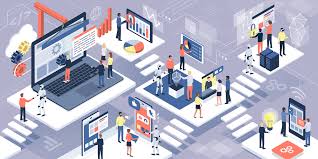I was involved in a fascinating Clubhouse discussion on the future of selling. There were all sorts of interesting insights with some drill downs into the implications of those.
We all know virtual will play an increased role in how sellers engage customers, but the more interesting perspective is how customers want to engage sellers and each other. As we see more organizations move to permanent work from home or other more flexible workplaces, how we want to sell/engage becomes less important than the pragmatic, how does the customer want to engage.
We are learning customers prefer no sales engagement at all, preferring digital alternatives to sales people (virtual or otherwise). At the same time, we know the quality of buying decisions suffers when sellers are not involved. What does this mean–both to the buyers and to selling? How do we help them recognize these challenges? How do we regain their trust/confidence? What does that engagement look like?
We know, our customers (and our own organizations) are going through massive digital business transformations, and as part of that, they are going through massive digital buying transformations. What does this mean in terms of our selling/customer engagement strategies.
Underlying all of these changes, we see massive changes in the future of work, particularly for knowledge based working. Both technology, social, and generational lifestyle preferences are changing the nature of what people look for in work and who they work for/with. These and business/market changes are changing the way companies look at work and their people. Are we moving more to a “gig” economy? Are we seeing continued “fluidity” in the work forces?
I think we misunderstand the application of technology, particularly AI/ML. I think the greatest impact will be augmenting the capabilities of knowledge workers and organizations, but I think the future of work is very human-centric. But with this, we see massive needs for skills changes, adaptability, living in uncertainty, disruption/change.
But we can never answer the question about “what is the future of sales/selling” without first answering the question, “what is the future of work?” As much as we want to optimize our sales workflow/processes, it is meaningless unless we understand our customers and how they view work and it’s future in their organizations.
We have to show up where our customers are (Well Dugghhh, Dave!). But we are going through a massive transformation in the next 10-15 years that impacts where and how we show up, where and how we most effectively engage our customers.
Some good news!
Our own companies are going through these changes. We can learn a lot just by what our own companies are doing to think and act on the future of work.
We can create great value with our customers by helping them rethink what they are doing and how they do it. While we are unlikely to address the entire issue, we can provide great insight in the areas in which we have great expertise.
I suspect the future of work will involve much greater cross organizational collaboration. For those of us that focus on creating great value with our customers, that is great news. We can establish far deeper relationships, for longer times, with our customers. They will increasingly be shared risk relationships (which has interesting implications for our pricing/revenue generation strategies).
I think our own focus will shift from sales to selling. Sales is a functional/organizational approach. Selling is a whole company approach around how and where we engage our customers. We will engage them digitally, We will engage them with different people and expertise from our organizations. We will probably see a shift in our engagement strategies from sales led/digitally supported to digitally led/sales supported.
This will demand a tremendous need for reskilling the people that do sell. Traditional selling skills will be displaced (if they haven’t already been) by skills like curiosity, critical thinking, problem solving, project management, collaborative conversations, business insight/acumen, change management, and orchestration.
None of this will happen overnight, though the pace at which it is happening seems to be accelerating.
I am, personally, hugely optimistic, about these changes. I am, also, hugely optimistic about how we can help our customers think about these changes and how they improve.
But we will never be able to answer the question, “What is the future of sales/selling,” without first understanding, “What is the future of work?”
Afterword: My thanks to Myke Hawkins for helping me learn this. Myke is doing some fascinating work in this area.

Leave a Reply